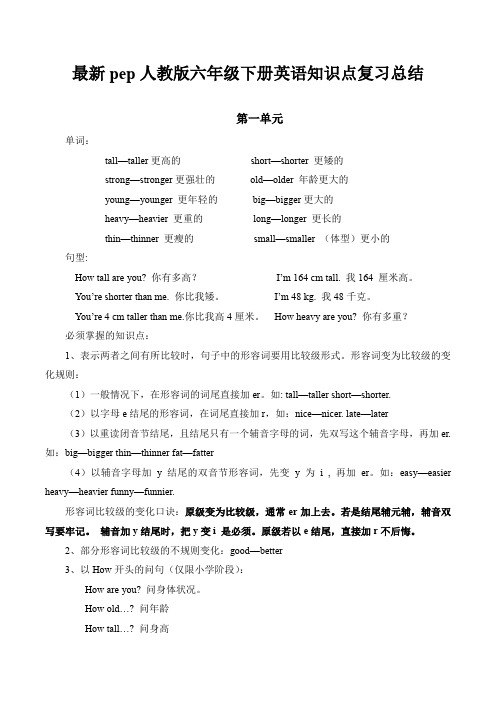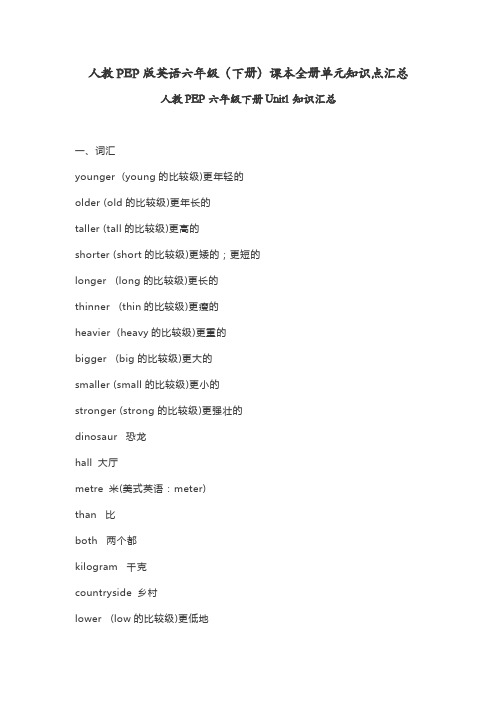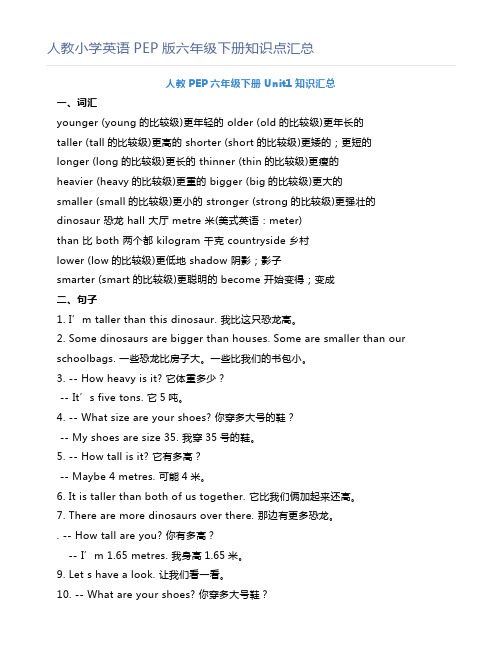【精品】最新人教PEP版六年级英语下册重点单词、短语汇总
最新pep人教版六年级下册英语知识点复习总结

最新pep人教版六年级下册英语知识点复习总结第一单元单词:tall—taller更高的short—shorter 更矮的strong—stronger更强壮的old—older 年龄更大的young—younger 更年轻的big—bigger更大的heavy—heavier 更重的long—longer 更长的thin—thinner 更瘦的small—smaller (体型)更小的句型:How tall are you? 你有多高?I’m 164 cm tall. 我164 厘米高。
You’re shorter than me. 你比我矮。
I’m 48 kg. 我48千克。
You’re 4 cm taller than me.你比我高4厘米。
How heavy are you? 你有多重?必须掌握的知识点:1、表示两者之间有所比较时,句子中的形容词要用比较级形式。
形容词变为比较级的变化规则:(1)一般情况下,在形容词的词尾直接加er。
如: tall—taller short—shorter.(2)以字母e结尾的形容词,在词尾直接加r,如:nice—nicer. late—later(3)以重读闭音节结尾,且结尾只有一个辅音字母的词,先双写这个辅音字母,再加er.如:big—bigger thin—thinner fat—fatter(4)以辅音字母加y结尾的双音节形容词,先变y为i , 再加er。
如:easy—easier heavy—heavier funny—funnier.形容词比较级的变化口诀:原级变为比较级,通常er加上去。
若是结尾辅元辅,辅音双写要牢记。
辅音加y结尾时,把y变i 是必须。
原级若以e结尾,直接加r不后悔。
2、部分形容词比较级的不规则变化:good—better3、以How开头的问句(仅限小学阶段):How are you? 问身体状况。
How old…? 问年龄How tall…? 问身高How long…? 问长度How big…? 问大小(指外型、形体的大小)How heavy…? 问体重、重量How many…? 问多少,物体的数量How much…? 问价格4、it’s 与its:这两个词发音相同但意义不同。
人教pep版六年级下册英语全册重要知识点总结

人教pep版六年级下册第一单元单元重要知识点总结四会单词:tall—taller更高的short—shorter 更矮的strong—stronger更强壮的small—smaller (体型)更小的old—older 年龄更大的young—younger 更年轻的big—bigger更大的heavy—heavier 更重的long—longer 更长的thin—thinner 更瘦的四会句型:How tall are you? 你有多高?I’m 164 cm tall. 我164 厘米高。
You’re shorter than me. 你比我矮。
You’re 4 cm taller than me.你比我高4厘米。
How heavy are you? 你有多重?I’m 48 kg. 我48千克。
应该掌握的知识点:1.表示两者之间有所比较时,句子中的形容词要用比较级形式。
形容词变为比较级的变化规则:(1)一般情况下,在形容词的词尾直接加er。
如: tall—taller short—shorter.(2)以字母e结尾的形容词,在词尾直接加r,如:nice—nicer late—later(3)以重读闭音节结尾,且结尾只有一个辅音字母的词,先双写这个辅音字母,再加er.如:big—bigger thin—thinner fat—fatter(4)以辅音字母加y结尾的双音节形容词,先变y为i , 再加er。
如:easy—easierheavy—heavier funny—funnier.形容词比较级的变化口诀:原级变为比较级,通常er加上去。
若是结尾辅元辅,辅音双写要牢记。
辅音加y结尾时,把y变i 是必须。
原级若以e结尾,直接加r不后悔。
2.部分形容词比较级的不规则变化:good—better well—better bad—worsebadly—worse many—more much—more little—less far—farther3.同义句:How tall are you?=What’s your height?How heavy are you?=What’s your weight?4.以How开头的问句(仅限小学阶段):How are you? 问身体状况。
人教PEP版英语六年级(下册)课本全册单元知识汇总

人教PEP版英语六年级(下册)课本全册单元知识点汇总人教PEP六年级下册Unit1知识汇总一、词汇younger (young的比较级)更年轻的older (old的比较级)更年长的taller (tall的比较级)更高的shorter (short的比较级)更矮的;更短的longer (long的比较级)更长的thinner (thin的比较级)更瘦的heavier (heavy的比较级)更重的bigger (big的比较级)更大的smaller (small的比较级)更小的stronger (strong的比较级)更强壮的dinosaur 恐龙hall 大厅metre 米(美式英语:meter)than 比both 两个都kilogram 千克countryside 乡村lower (low的比较级)更低地shadow 阴影;影子smarter (smart的比较级)更聪明的become 开始变得;变成二、句子1. I’m taller than this dinosaur. 我比这只恐龙高。
2. Some dinosaurs are bigger than houses. Some are smaller than our schoolbags. 一些恐龙比房子大。
一些比我们的书包小。
3. -- How heavy is it? 它体重多少?-- It’s five tons. 它5吨。
4. -- What size are your shoes? 你穿多大号的鞋?-- My shoes are size 35. 我穿35号的鞋。
5. -- How tall is it? 它有多高?-- Maybe 4 metres. 可能4米。
6. It is taller than both of us together. 它比我们俩加起来还高。
7. There are more dinosaurs over there. 那边有更多恐龙。
PEP人教版小学六年级英语下册单词及语法考点总复习资料

PEP人教版小学六年级下册【单词考点】Unit 1:tall—taller 更高的short—shorter更矮的strong—stronger 更强壮的old—older 年龄更大的young—younger 更年轻的big—bigger更大的heavy—heavier更重的long—longer更长的thin—thinner 更瘦的small—smaller (体型)更小的Unit 2:have a fever发烧have a sore throat喉咙疼have a cold感冒have a toothache牙疼have a headache 头疼matter事情,麻烦sore疼的hurt疼痛nose鼻子tired 疲劳的,累的excited兴奋的angry生气的happy高兴的bored无聊的,烦人的sad忧伤的,悲伤的Unit 3:watch—watched 看wash—washed洗clean—cleaned打扫play—played玩visit—visited看望do—didlast weekend 上一个周末 go—went去go to a park—went to a park去公园Go swimming—went swimming 去游泳go fishing—went fishing 去钓鱼read—read读go hiking—went hiking去郊游Unit 4:learn Chinese—learned Chinese学汉语sing and dance—sang and danced唱歌和跳舞eat good food—ate good food吃好吃的食物take pictures—took pictures照相climb—climbed爬have—had buy presents—bought presents买礼物row a boat—rowed a boat划船see elephant—saw elephant看大象go skiing—went skiing去滑雪go ice-skating—wentice-skating 去滑冰how怎么,如何get—got到达last上一个的,仅余的,留在最后的【三会单词】little 小的tail尾巴think 想size尺码wear穿、穿着people人、人们know知道、懂得pass通过、经过guess 猜、猜测game游戏cook-cooked做饭study –studied学习【语法考点】Unit 1 How Tall Are You?时态:比较级在一般现在时中的运用1.How 引导的特殊疑问句,来谈论对方的身体情况:--- How + (高、矮、胖、瘦等与身体有关的)形容词+ are you? --- I'm + 与身体有关的具体数值。
人教PEP版六年级下册英语科各单元知识点

Unit One知识点一:形容词/副词的比较级变化规则(适用于单音节词和部分双音节词)1.在词尾加er,如tall→taller;2.以字母e结尾的词,在词尾加r,如nice→nicer;3.以辅音字母+y结尾的形容词,先把y变为i,再加er,如early→earlier;4.以重读闭音节结尾的形容词,要双写最后一个字母,再加er,如big→bigger,hot→hotter,thin→thinner,fat→fatter,red→redder。
不规则变化的比较级:many/much→more,good/well→better,little→less(表示“更少”,修饰不可名词)知识点二:比较级常用句型1.You’re taller than me.你比我高。
2.I’m one year older than you. 我比你大一岁。
3.Which is nice,the red one or the green one ?哪一个更好看,红色的还是绿色的?知识点三:部分双音节和多音节形容词的比较级部分双音节和多音节形容词,在词前加more构成比较级,如interesting→more interesting,difficult→more difficult(更困难的)知识点四:比较级+and+比较级比较级+and+比较级:可表示“越来越……”,如:1. longer and longer:表示“越来越长”2.taller and taller:表示“越来越高”3.more and more interesting:表示“越来越有趣”知识点五:how tall/heavy/long的用法How tall:表示“多高”How heavy:表示“多重”How long:表示“多长”知识点六:size与what sizeSize:表示“大小,尺寸”What size:表示“几码,多大尺寸”知识点七:形容词/副词最高级的变化规则(适用于单音节词和部分双音节词)1.在词尾加est,如tall→tallest2.以字母e结尾的词,在词尾加st,如nice→nicest3.以辅音字母+y结尾的形容词,先把y变成i,再加上est,如early→earliest;4.以重读闭音节结尾的形容词,要双写最后一个字母,再加est,如big→biggest,hot→hottest,thin→thinnest,fat→fattest,red→reddest。
人教小学英语PEP版六年级下册知识点汇总

人教小学英语PEP版六年级下册知识点汇总人教PEP六年级下册Unit1知识汇总一、词汇younger (young的比较级)更年轻的 older (old的比较级)更年长的taller (tall的比较级)更高的 shorter (short的比较级)更矮的;更短的longer (long的比较级)更长的 thinner (thin的比较级)更瘦的heavier (heavy的比较级)更重的 bigger (big的比较级)更大的smaller (small的比较级)更小的 stronger (strong的比较级)更强壮的dinosaur 恐龙 hall 大厅 metre 米(美式英语:meter)than 比 both 两个都 kilogram 千克 countryside 乡村lower (low的比较级)更低地 shadow 阴影;影子smarter (smart的比较级)更聪明的 become 开始变得;变成二、句子1. I’m taller than this dinosaur. 我比这只恐龙高。
2. Some dinosaurs are bigger than houses. Some are smaller than our schoolbags. 一些恐龙比房子大。
一些比我们的书包小。
3. -- How heavy is it? 它体重多少?-- It’s five tons. 它5吨。
4. -- What size are your shoes? 你穿多大号的鞋?-- My shoes are size 35. 我穿35号的鞋。
5. -- How tall is it? 它有多高?-- Maybe 4 metres. 可能4米。
6. It is taller than both of us together. 它比我们俩加起来还高。
7. There are more dinosaurs over there. 那边有更多恐龙。
人教版PEP六年级英语下册单词表(带音标)
人教版PEP六年级英语下册单词表(带音标)人教版PEP六年级英语下册单词表(带音标)Unit 1tall[t`:l]—taller[t`:lə]更高的shrt[ʃ`:t]—shrter [ʃ`:tə]更矮的strng [str`ŋ]—strnger [str`ŋə]更强壮的ld[əuld]—lder [əuldə]年龄更大的ung[>ŋ]—unger [ˈ>ŋɡə]更年轻的(entieter [ˈsentii:tər]) 厘米than [ðən]与…相比较little [ˈlitl]小的tail [teil]尾巴thin [θiŋ]想;思考funn[ˈf>ni] —funnier [ˈf>niə]更滑稽的g(ilgra [ˈɪləɡræ]) 千克;公斤big [biɡ]—bigger [biɡə]更大的heav [ˈhevi]—heavier [ˈheviə]更重的lng [l`ŋ]—lnger [l`ŋə]更长的thin [θin]—thinner [ˈθɪnə]更瘦的sall [s`:l]—saller [s`:lə]体型更小feet [‘fi:t, fi:t]脚(复数)size [saiz]号码;尺码ear[εə] 穿eter[i:tə] 米tn[t>n, tuŋ] 吨eah[i:tʃ] 各自;每个squid[sid] 鱿鱼lbster[‘l`bstə] 龙虾shar[ʃɑ:] 鲨鱼deep[di:p] 深的seal[si:l] 海豹sper[spə:] hale[heil] 抹香鲸i ller[‘ilə] hale[heil] 虎鲸even [‘i:vən]甚至Unit 2have a fever[‘fi:və] [hæv ei ˈfi:və]发烧hurt [hə:t] 疼痛have a ld [hæv ə əuld]感冒have a tthahe [hæv ei ˈtu:θˌeɪ]牙疼have a headahe [hæv ə ˈhedei]头疼have a sre [s`:] thrat [θrəut]喉咙疼atter[‘ætə]事情,麻烦sre [s`:]疼的feel [fi:l]感觉si[si] 不舒服的;有病的hurt[hə:t]疼痛nse[nəuz] 鼻子peple[‘pi:pl] 人们flu[flu:] 流感n[nəu] 知道ight [ait]可以;能rr[‘>ri, ‘ə:ri] 烦恼;担忧ediine[‘edisin] 药drin [driŋ]饮料sta[stei] 在;逗留better [ˈbetə]更好的sn [su:n]立刻;不久tired[‘taiəd]疲劳的,累的exited[i’saitid]兴奋的angr[‘æŋɡri]生气的;愤怒的happ[‘hæpi]高兴的bred[b`:d]无聊的,烦人的sad[sæd] 忧伤的,悲伤的trip[trip] 旅行fail [feil]不及格;失败test [test]测试hear[hiə] 听见;听到ath[ætʃ] 比赛beteen[bi’ti:n] 在…之间pass[pɑ:s, pæs] 传递i[i] 踢a little [ə ˈlitl]有些gal[ɡəul] 得分bune[bauns] 反弹ff [`f]距;离;离开anther[ə’n>ðə] 另一个gues s[ɡes] 猜测in[in]过去式n [>n, ə<n]赢gae [ɡei]比赛laugh [lɑ:f, læf] at 因…而发笑Unit 3ath [`tʃ]—athed [`tʃt]看ash[`ʃ]—ashed [`ʃt]洗lean [li:n]—leaned[li:nd]打扫pla[pleɪ]—plaed[pleid]玩visit [ˈvizit]—visited [ˈvizitid]看望d [du:, du, də, d]—did [did]last [lɑ:st]上一个eeend[ˌi:ˈend]周末[u]—ed [ut]做(饭)g [ɡəu]—ent[ent]去t[tu:,tu,tə]向;朝par[pɑ:]公园g siing [ɡəu ˈsɪɪŋ]—ent[ent] siing去游泳read[ri:d]—read [red] 读g fishing—ent fishing[ˈfɪʃɪŋ]去钓鱼g hiing—ent hiing [haiɪŋ]去郊游esterda[‘estədi,-dei] 昨天stud[‘st>di]过去式studied[ˈst>di:d]学习tngue tister [t>ŋ ˈtɪstə]绕口令fl[flai]过去式fle [flu:]飞return[[ri’tə:n]] 送回;归还si[si]过去式sa[sæ]游泳Unit 4learn[lə:n]—learned [ˈlə:nid] 学习hinese [tʃaɪˈni:z, -ˈni:s]中;汉语sing[siŋ] —sang[sæŋ] 唱歌and [ænd, ənd, ən]和dane[dɑ:ns, dæns] —daned[dɑ:nst]跳舞eat[i:t]—ate[et,eit] 吃gd [ɡud]好的tae [tei]—t[tu] 照;拍lib [lai]—libed [laid]爬have [hæv, həv, əv, v]—had [hæd]usin [ˈ>zn]堂表兄弟;堂表姐妹I’ll=I ill [il]bu[bai]—bught[b`:t] 买present [ˈprezənt]礼物r[rəu]—red[rəud]划船abat [bəut]小船see[si:]—sa[s`:] 看elephant [ˈelifənt]大象g siing[ˈsi:ɪŋ]—ent siing 去滑雪g ie-sating [ais ˈseɪtɪŋ]—ent ie-sating 去滑冰h [hau]怎么,如何get [ɡet]—gt [g`t]到达last [lɑ:st] [læst]上一个的,仅余的,留在最后的relax[ri’læs] 放松prepare[pri’pεə] 准备。
人教PEP版六级下册英语小升初重点单词及短语汇总
六年级上下册短语六年级上册单词表Unit 1get up起床have breakfast吃早餐go to school去上学School begins.开始上课have lunch吃午饭School is over放学go home回家have dinner吃晚饭watch TV看电视go to bed睡觉breakfast早餐lunch午餐dinner晚餐cook breakfast做早餐teach English教英语take a walk散步read stories读故事walk走;步行every每一个morning早晨afternoon下午evening晚上;傍晚see a film看电影play the piano弹钢琴clean the window擦窗户clean the door擦门clean the floor擦地板often时常easy容易difficult困难Unit 2collect toy cars搜集玩具汽车collect stamps搜集邮票collect maps搜集地图collect picture cards搜集图片open开;打开hobby爱好map地图box盒子colour颜色go fishing去钓鱼plant flowers种花cook meals做饭dad爸爸mum妈妈plant植物;种植flower花drink喝tea茶play computer games玩电脑游戏make dolls take photos照相photo照片kid小孩baby婴儿hungry饿的cry哭Unit 3invite your friends to your party 邀请朋友参加聚会celebrate your birthday with your friends与朋友庆祝生日time时间after在......后then那时me我(I的宾格)bye再见star-shaped cake星形蛋糕jelly果冻fruit pie水果派;水果馅饼kind种类chocolate巧克力ice cream冰激凌candy糖果sure当然light the candles点蜡烛sing the birthday song唱生日歌make a wish许愿blow out the candles吹蜡烛cut the cake切蛋糕eat the cake吃蛋糕here在这里for给;为了light点燃Unit 4the first month of the year一年里的第一个月the second month of the year 一年里的第二个月New Year's Day元旦Spring Festival春节January一月February二月back回原处;后面their他(她,它)们的the third month of the year 一年里的第三个月the fourth month of the year一年里的第四个月Tree Planting Day植树节Easter复活节March三月April四月tree树;树木grass草;草地stop(使)停egg蛋;卵the fifth month of the year 一年里的第五个月the sixth month of the year 一年里的第六个月Labour Day劳动节May五月June六月Mother’s Day母亲节Children’s Day儿童节Father’s Day父亲节heard-shaped cake心形蛋糕give a birthday card to your friend向朋友赠送生日礼Unit 5the seventh month of the year一年里的第七个月the eighth month of the year一年里的第八个月the Party’s birthday党的生日Army Day建军节July七月August八月month月year年the ninth month of the year一年里的第九个月the tenth month of the year一年里的第十个月National Day国庆节September九月October十月the eleventh month of the year 一年里的第十一个月the twelfth month of the year 一年里的第十二个月Thanksgiving感恩节Christmas圣诞节November十一月December十二月Teacher’s Day教师节Unit 6farm the land种地;种田go on spring outgoings去春游fly kites放风筝season季节spring春天little一点green绿色(的)bird鸟fly飞go on a trip去旅游go to a summer camp去夏令营have summer holidays过暑假begin开始close关;关闭summer夏天weather天气heavy重的rain雨;下雨pick apples摘苹果cut rice割稻子make a snowman堆雪人sweep the snow autumn秋天yellow黄色(的)brown棕色(的)white白色(的)winter冬天snowman雪人六年级上册短语总结Unit11.be from/come from 来自于2.Primary Six 第六小学3.Grade Six 六年级4.let sb do sth 让某人做某事5.tell sb about sth 告诉某人关于某事6.tell sb to do sth 告诉某人做某事7.daily life 日常生活8.get up 起床9.in the morning 在早上10.have breakfast 吃早饭11.at six 在六点钟at about six 在六点钟12.go to school去学校13.School begins开始上课14.have seven subjects 有七门课15.have lunch吃午餐16.at school在学校17.School is over放学18.in the afternoon在下午19.go home 回家20.have dinner 吃晚餐21.watch TV 看电视22.for 30 minutes 30分钟23.do some reading阅读24.go to bed去睡觉25.How about=what about怎么样26.best wishes最好的祝愿27.be happy to do sth 高兴做某事28.get your email 收到你的邮件29.in Grade Six 在六年级30.an English teacher 一位英语老师31.every morning 每天早上32.cook breakfast 做早饭33.go to school 去上学34.have four lessons a day一天有四节课35.learn English 学英语36.by doing sth 通过做某事37.play games 玩游戏38.like sth very much 非常喜欢某事39.cook dinner 做晚餐40.after dinner 晚饭41.take a walk 散步42.read sth to sb 读某东西给某人43.On Saturday 每周六44.see a film 看电影45.have piano lessons上钢琴课46.It is adj to do sth 做某事是怎么样的47.help sb (to) do sth帮助某人做某事48.help sb with sth 帮助某人某事49.practice doing sth 练习做某事50.enjoy doing sth 喜欢做某事51.at home 在家52.do the housework 做家务53.learn from sb 向某人学习54.should do sth 应该做某事55.teach English 教英语56.read stories 读故事57. clean the window 擦窗户58.clean the door 擦门59.clean the floor 擦地板Unit 21.a new toy car一辆新的小汽车2.have a look看一看3.open the box and see打开盒子看一看4.What a super car!多棒的一辆小车啊!5.collect stamps收集邮票6.1)How about you? 你呢?2) How about doing sth ? 做...怎么样?7.collect maps收集地图8.collect picture cards收集图片9.so colourful and beautiful如此多彩漂亮10.want to do sth 想要做某事11.look at 看一看12.my family photos我的全家福13.plant flowers种花14.drink Chinese tea喝中国茶15.That’s great那太棒了!16.That’s interesting那太有趣了!17.That’s wonderful那太棒了!18.look at this photo看这个照片19.in this photo在这个照片里20.at her birthday party在她的生日派对21.make a doll= make dolls做布娃娃22.be interested in sth 对某事感兴趣23.be interested in doing sth对做某事感兴趣24.play computer games玩电脑游戏25.take photos拍照片26.two photos两张照片27.look at this one看这一个28.How cute!多么可爱呀!29.feed the baby喂养婴儿30.What a super kid!多棒的小孩子呀!31.take good care of sb = look after sbwell 照顾好某人32. cook meals做饭33.collect toy cars收集玩具小汽车34.go fishing去钓鱼Unit31.invite your friends to your party邀请朋友参加聚会2.celebrate your birthday with your friends 与朋友庆祝生日3.give a birthday card to your friend 向朋友赠送生日贺卡4.Thank you very much.=Thanks very much. 非常感谢5.would like to do sth. = want to do sth.想要做某事6.my birthday party 我的生日聚会7.I’d love to. 我愿意。
(完整)PEP人教版小学六年级英语下册复习资料
最新PEP人教版小学六年级下册总结Unit 1 How Tall Are You?【词汇考点】tall—taller更高的long—longer更长的short—shorter更矮的heavy—heavier更重的thin—thinner更瘦的strong—stronger 更强壮的big—bigger更大的small—smaller更小的old—older 年龄更大的young—younger 更年轻的【语法考点】时态:比较级在一般现在时中的运用一.形容词比较级和最高级的变形规则1.一般单音节词和少数以-er,-ow结尾的双音节词,比较级在后面加-er,最高级在后面加-est;(1)单音节词如:small→smaller→smallest short→shorter→shortest tall→taller→tallest (2)双音节词如:clever→cleverer→cleverest narrow→narrower→narrowest2.以不发音e结尾的单音节词,比较在原级后加-r,最高级在原级后加-st;如:large→larger→largest nice→nicer→nicest able→abler→ablest 3.在重读闭音节(即:辅音+元音+辅音)中,先双写末尾的辅音字母,比较级加-er,最高级加-est;如:big→bigger→biggest hot→hotter→hottest fat→fatter→fattest 4.以“辅音字母+y”结尾的双音节词, 把y改为i,比较级加-er,最高级加-est;如:easy→easier→easiest heavy→heavier→heaviestbusy→busier→busiest happy→happier→happiest5.其他双音节词和多音节词,比较级在前面加more,最高级在前面加most;如:beautiful→more beautiful→most beautifuldifferent→more different→most differenteasily→more easily→most easily注意:(1)形容词最高级前通常必须用定冠词 the,副词最高级前可不用.例句: The Sahara is the biggest desert in the world.(2)形容词most前面没有the,不表示最高级的含义,只表示"非常".It is a most important problem.=It is a very important problem.6.有少数形容词、副词的比较级和最高级是不规则的,必须熟记.如:good→better→best well→better→best bad→worse→worst ill→worse→worstold→older/elder→oldest/eldest many/much→more→most little→less→leastfar→further/farther→ furthest/farthest二.重点句型1. How 引导的特殊疑问句,来谈论对方的身体情况:--- How + (高、矮、胖、瘦等与身体有关的)形容词 + are you?--- I'm + 与身体有关的具体数值+单位例: A: How tall are you?B: I'm 164 cm tall.2. 比较级,用来对自己和他人的身体特征进行比较:--- You are + 形容词的比较级 + than me.--- I'm + 形容词的比较级 + than you.例: I'm thinner than you.My hands are bigger than yours.注意:比较的两者必须是同类的。
人教版PEP六年级下册英语1-4单元知识梳理
人教版PEP六年级下册英语1-4单元知识梳理新版PEP六年级英语下册Unit1知识点归纳一、必背词汇tall------taller 高的----更高的dinosaur恐龙short------shorter矮的/短的----更矮的/更短的hall大厅long------longer长的----更长的than比strong------stronger 强壮的----更强壮的both两个都old------older老的/旧的----更老的/更旧的meter米形容词young------younger年轻的----更年轻的kilogram千克;公斤adj.small------small小的----更小的otherssize号码thin------thinner瘦的----更瘦的feet脚heavy------heavier重点----更重的wear穿low------lower低地----更低地countryside乡村smart------smarter聪明的----更聪明的shadow影子;阴影become变成;开始变得辅+元+辅--------双写最后一个辅音字母+er辅音字母+y-----改y为i+erbig-----bigger大的-----更大的happy-----happier开心的-----更开心的thin-----thinner瘦的-----更瘦的heavy-----heavier重的------更重的fat-----fatter胖的------更胖的funny-----funnier滑稽的------更滑稽的二、重点句型⑴问年龄,身高,体重等Howoldareyou?Howtallareyou?Howheavyareyou?----I’m_______(yearsold).----I’m______metrestall.----I’m______kilograms.⑵问物品的情况:①Howlargeisyourroom?你的房间有多大?It’s__________m2(squaremeters.)有_______平方米。
- 1、下载文档前请自行甄别文档内容的完整性,平台不提供额外的编辑、内容补充、找答案等附加服务。
- 2、"仅部分预览"的文档,不可在线预览部分如存在完整性等问题,可反馈申请退款(可完整预览的文档不适用该条件!)。
- 3、如文档侵犯您的权益,请联系客服反馈,我们会尽快为您处理(人工客服工作时间:9:00-18:30)。
1 PEP英语六年级(下册) Unit 1 How tall are you ? 一.必背单词 (形容词的比较级) 一般形容词→词尾+er tall —— taller 高的----更高的 short —— shorter 矮的/短的----更矮的/更短的 long —— longer 长的----更长的 strong—— stronger 强壮的----更强壮的 old —— older 老的/旧的----更老的/更旧的 young—— younger 年轻的----更年轻的 s mall —— small 小的----更小的 low—— lower 低地----更低地 smart——smarter 聪明的 ----更聪明的 以e结尾的形容词→词尾+r large —— larger 大的----更大的 late —— later 晚的----更晚的 simple —— simpler 简单的----更简单的 safe —— safer 舒服的----更舒服的 以重读闭音节结尾,辅+元+辅 →双写最后一个辅音字母+er big——bigger 大的——更大的 thin——thinner 瘦的——更瘦的 fat——fatter 胖的——更胖的 sad ——sadder难
4 2
过的——更难过的 hot——hotter 热的——更热的 wet——wetter 潮湿的——更潮湿的 ④辅音字母+y 结尾→改 y 为 i +er happy——happier 开心的——更开心的 heavy——heavier 重的——更重的 funny——funnier 滑稽的——更滑稽的 angry——angrier 生气的----更生气的 sunny——sunnier 生气的----更生气的 windy——windier 有风的的----更有风的 busy——busier 忙的----更忙的 early——earlier 提早的----更早的 dinosaur 恐龙 hall 大厅 than 比 both 两个都 meter 米 kilogram 千克;公斤 size 号码 feet 脚 wear 穿 countryside 乡村 shadow 影子;阴影 become 变成;开始变得 二.重点句型 ⑴ 问年龄,身高,体重等 How old are you? How tall are you? How heavy are you? --- I’m _______ (years old). --- I’m ______metres tall.
4 3
---- I’m ______ kilograms . ⑵ 问物品的情况: ① How large is your room? 你的房间有多大? It’s ______ m (square meters.) 有___平方米。 ② How long is your bed? 你的床有多长? It’s _________cm long. 有______厘米长。 ③ How big are your feet? (= What size are your shoes?) 你的脚有多长? I wear size ______.(= My shoes are size________.) 我穿_______码的鞋。 ⑶ 形容谁比谁更… … ① 主语 + be (am is are)( even/much ) …er than … 如:I am taller than you. 我比你高。 I am 4 cm taller than your brother. 我比你弟弟高 4cm . I am taller and stronger than your brother. 我比你的弟弟更高更壮。 Jack is even stronger than his father. Jack 甚至比他爸爸还壮。 Zhang Peng and John are much younger than Mr.Green. 张鹏和 John 比 Mr. Green 要年轻多了。 其它句型: 1. That’s the tallest dinosaur in this hall. 那是这个厅里最高的恐龙。
4 4
2. It’s taller than both of us together. 它比我俩加起来还高。 3. Your feet are bigger than mine. 你的脚比我的大。 4. There are more dinosaurs over there. 那儿有更多的恐龙。 5. Who is taller than you? 谁比你高? 6. You are becoming a big beautiful bird. 你将要变成一只美丽的大鸟。 7. The sun gets lower and lower, but my shadow gets longer and longer. 太阳变得越来越低,我的影子变得 越来越长。
Unit 2 Last weekend 一.必背词汇:(词组的过去式) clean---cleaned my room 打扫我的房间 wash ---washed my clothes 洗我的衣服 stay---stayed at home 待在家里 watch---watched TV 看电视 drink---drank tea 喝茶 have---had a cold 感冒 see---saw a film 看电影 read---read a book 看书 sleep---slept 睡觉 cook--cooked the food visit--visited my grandparents 看望我的(外)祖父母 play--played football 踢足球 study--studied English 学英语
4 5
do ---did something else 做些其他的事 go---went boating 划船 make---made the beds 整理床铺 show 演出 magazine 杂志 better 更好的(good,well 的比较级) faster(更快的) hotel(旅馆) fixed(修理) broken(破损的) lamp (台灯) loud(喧闹的,大声的) enjoy(享受…乐趣,喜爱) stay(暂住,逗留) last weekend 上个周末 last Monday 上个星期一 last night 昨晚 y esterday evening 昨天晚上 yesterday 昨天 the day before yesterday 前天 二.语法知识: 1. 动词的过去式 构成规则: (1) 一般动词在词尾加上 ed 。如:worked , washed played (2)以 e 结尾的动词在词尾加上 d. 如 :used, lived (3) 以辅音字母和 y 结尾的动词改 y 为 i ,再加上 ed . 如:studied , emptied (4) 末尾只有一个辅音字母的重读闭音节词,双写最后的辅音字母, 再加 ed 如:stopped 发音规则: ①在浊辅音和元音后面读/d/ ②在清辅音后面读/t/ ③
4 6
在/t/和/d/后面读/id/ 2.句型: (1)询问在过去的某一个时间做了什么,借助助动词 did 特殊疑问句 —— What did you do yesterday / last weekend ? —— I did my homework . 一般疑问句,把 did 提前 —— Did you help your parents clean the room ? ( 当句子变为一般疑问句,动词应还原成动词原形) —— Yes , I did ./No, I didn’t . 三.重点句型: 1. ---How was your weekend? ---It was good, thank you. 你周末过得怎么样? 很好,谢谢。 2. ---What did you do? 你(周末)干什么? ---I stayed at home with your grandma. We drank tea in the afternoon and watched TV. 我和你奶奶待在家里。我们喝了下午茶,还看了电视。 3. ---Did you do anything else? 你还做了其他什么事吗? ---Yes, I cleaned my room and washed my clothes. 是的,我打扫了房间,还洗了衣服。 4. I want to buy the new film magazine. 我想买期新的电影杂志。 5. --- What did you do last weekend? Did you see a film? 你上
4 7
周末干什么?你看电影吗? --- No, I had a cold. I stayed at home all weekend and slept. 没有,我感冒了。整个周末都待在家里睡觉。
Unit 3 Where did you go? 一.必背词汇:(动词词组 及其过去式) go fishing--- went fishing 去钓鱼 Labour Day 劳动节 go camping --- went camping 去野营 mule 骡子 go swimming--- went swimming 去游泳 Turpan 吐鲁番 ride a bike--- rode a bike 骑自行车 could (can 的过去式)能 ride a horse--- rode a horse 骑马 till 直到 hurt my foot--- hurt my foot 我的脚受伤 beach 海滩;沙滩 take pictures--- took pictures 照相 basket 篮;筐 buy gifts--- bought gifts 买礼物 part 角色 eat fresh food--- ate fresh food 吃新鲜的食物 licked (lick 的过去式)舔 fall off---fell off 从…摔倒 laughed
4
